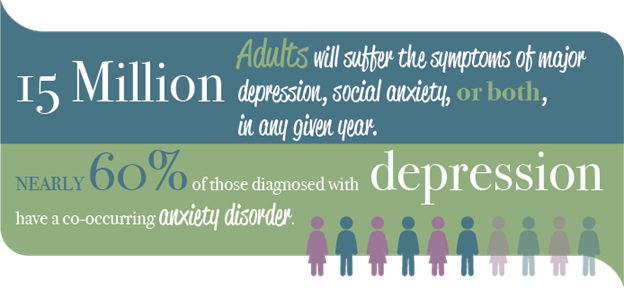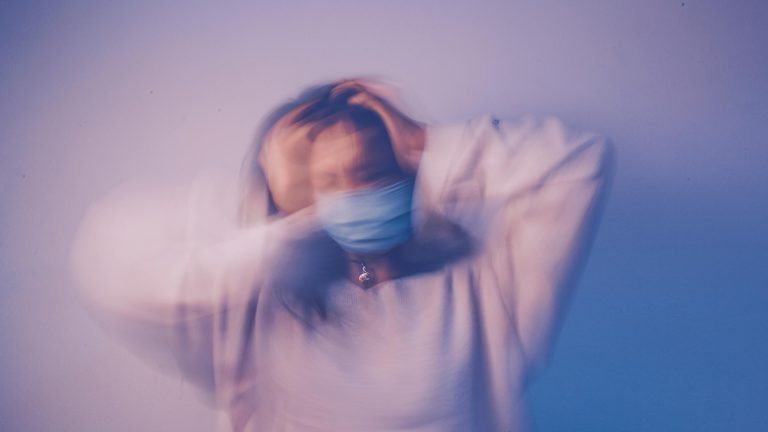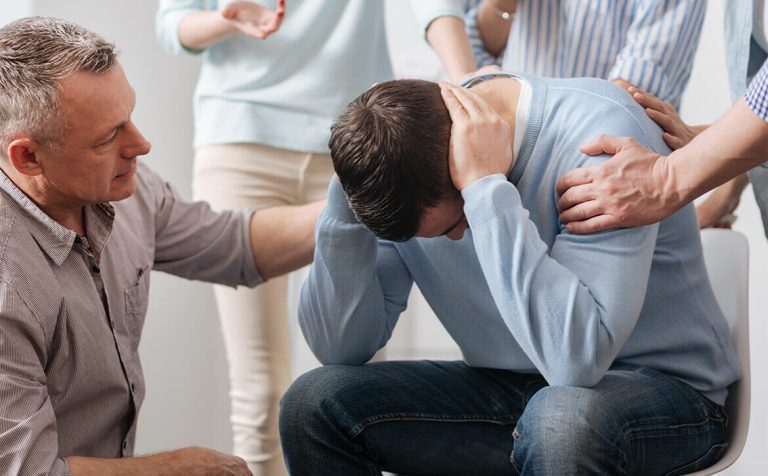Social anxiety disorder (SAD) and major depressive disorder (MDD) are common mental health conditions, and a significant portion of the population experiences symptoms of both. This article explores the connection between these conditions, including:
- Statistics on co-occurring social anxiety and depression
- Signs and symptoms of each disorder
- Why social anxiety can lead to depression
- Effective treatment options for both conditions
High Rates of Co-Occurring Social Anxiety and Depression
Studies reveal a high prevalence of social anxiety disorder and depression, often occurring together. Here are some key statistics:
- Lifetime prevalence: 13.3% for social anxiety and 16.2% for major depression in American adults.
- 12-month prevalence: 6.8% for social anxiety and 6.7% for major depression in American adults.
- In a given year: An estimated 15 million adults experience symptoms of major depression, social anxiety disorder, or both.
These numbers show a significant overlap between the two conditions.

While social anxiety and depression share some symptoms, they also have distinct characteristics. Here’s a breakdown of each:
Social Anxiety Disorder (SAD) Symptoms
- Physical symptoms: Rapid heartbeat, sweating, muscle tension, nausea, dizziness.
- Emotional/psychological symptoms: Fear of negative evaluation, low self-esteem, avoidance of social situations, intrusive thoughts.
Major Depressive Disorder (MDD) Symptoms
- Feeling hopeless, empty, or sad most of the day.
- Loss of interest in pleasurable activities.
- Significant changes in weight or appetite.
- Sleep problems (insomnia or hypersomnia).
- Psychomotor agitation or retardation.
- Difficulty concentrating or making decisions.
- Recurrent thoughts of death or suicide.
Why Social Anxiety Can Lead to Depression
Social anxiety symptoms can significantly impact a person’s life, leading to:
- Social isolation and loneliness
- Low self-esteem and shame
- Chronic inactivity and boredom
- Unfulfilled goals and dreams
- Negative experiences with others
These factors can contribute to feelings of hopelessness and helplessness, eventually triggering depression.
10 Reasons Social Anxiety Causes Depression
1. Wanting to find a significant other, and never finding him/her
Anxiety undermines our human relationships, and prevents them from being as successful as they could be.
2. Avoiding situations even when we want to hang out and be friendly
“I can’t go because I’ll be too uncomfortable and I’ll feel inhibited and self-conscious. It’s easier for me to just stay at home.”
3. Not feeling like we are part of a group or family
We all want to feel like we belong, especially with other people who share the same interests in life, but anxious feelings block this from happening.
4. Lack of meaningful friendships
People with social anxiety want to have many friends and acquaintances they can spend time with and relax around, but the anxiety prevents this from happening.
5. Not being able to pursue our desired career
“I’d like to take that promotion, but then I’d have to manage people and tell them what to do. I can’t do that!”
6. Inability to participate in professional or informal activities
Those of us with social anxiety feel a great deal of fear when we must attend informal or professional events with other people. We feel as if we will do something wrong and make a fool of ourselves.
7. Not seeing light at the end of the tunnel
“I’ll never get any better – I’ll be stuck with anxiety forever.”
8. Beating ourselves up
We get down on ourselves and focus on our perceived shortcomings. We often feel as if we’re not as good or capable as other people. “Everyone else is enjoying life and having a good time. Why can’t I?”
9. Comparing ourselves to others
We feel other people are farther along in life than we are. “Everyone has fun and interesting friends they can hang out with – except me.”
10. Feeling like we can’t do things
The anxiety we feel makes us feel restricted from participating in everyday activities. “I can’t go to the party because I’ll feel too out of place and uncomfortable.”
Effective Treatment Options for Co-Occurring Disorders
Fortunately, both social anxiety and depression are highly treatable. Here are some evidence-based treatment approaches:
- Psychotherapy: Techniques like CBT, psychodynamic therapy, and EMDR can effectively address both conditions.
- Medication: Antidepressants can alleviate symptoms of social anxiety and depression.
- Life Skills Training: Developing social skills and self-awareness can be beneficial.
- Lifestyle Changes: Healthy sleep, exercise, and diet can improve mood and well-being.
- Holistic Therapies: Practices like yoga, meditation, and massage therapy can manage anxiety and mood.
Seeking Help is Crucial
With proper treatment, individuals can experience significant improvement and live fulfilling lives. If you suspect you or someone you know struggles with social anxiety, depression, or both, contact us today.





